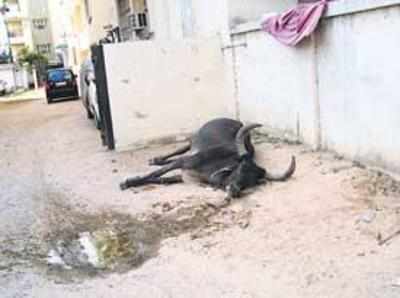Cow carcasses pile up as Dalits protest prejudice in Gujarat

Ahmedabad: On the outskirts of Prime Minister Narendra Modi 's home city, the stench from cow carcasses littering the roadside is overpowering as Gujarat's lowest social caste keeps up protests against deep-rooted discrimination. Dalits stopped collecting carcasses more than two months ago in Gujarat state, after the brutal beating of four dalit youths accused of killing a cow.
A video of the public flogging carried out by upper-caste cow-protection vigilantes in Gujarat went viral, triggering outrage across the country. "Our Dalit brothers were thrashed so severely merely for doing what has been their work for centuries," said Somabhai Yukabhai, 49, among those who have stopped collecting and skinning dead cows, a traditional and grisly job restricted to dalits.
"I would rather starve to death than collect the dead cows," said the father of three, as a dog feasted on calf remains on the outskirts of Gujarat's largest city Ahmedabad.
The carcasses are seen by critics as an embarrassing eyesore for Hindu nationalist Modi who has long hailed Gujarat as a shining example of India's economic progress. His party also risks losing votes at upcoming elections because of the fury about the attack in July.
The attack, during which the youths were stripped to their waists before being flogged, shows violence is still being meted out to dalits six decades after India banned caste discrimination.
Authorities have concluded a wild lion, not the four youths, killed the cow and the youngsters were legally skinning the animal for its leather. Police this month formally filed charges against their attackers.
The incident was a tipping point for many dalits, who feel they can no longer tolerate such attacks, said charismatic Dalit leaderJignesh Mevani .
"Economic exploitation on one hand and caste-based violence on the other has completely frustrated them, especially the youth," said Mevani, a 35-year-old lawyer.
"The Una (village) incident proved to be the last straw."
A video of the public flogging carried out by upper-caste cow-protection vigilantes in Gujarat went viral, triggering outrage across the country. "Our Dalit brothers were thrashed so severely merely for doing what has been their work for centuries," said Somabhai Yukabhai, 49, among those who have stopped collecting and skinning dead cows, a traditional and grisly job restricted to dalits.
"I would rather starve to death than collect the dead cows," said the father of three, as a dog feasted on calf remains on the outskirts of Gujarat's largest city Ahmedabad.
"The fight now is about our dignity. We will not sit quietly now," he added.
The carcasses are seen by critics as an embarrassing eyesore for Hindu nationalist Modi who has long hailed Gujarat as a shining example of India's economic progress. His party also risks losing votes at upcoming elections because of the fury about the attack in July.
The attack, during which the youths were stripped to their waists before being flogged, shows violence is still being meted out to dalits six decades after India banned caste discrimination.
Authorities have concluded a wild lion, not the four youths, killed the cow and the youngsters were legally skinning the animal for its leather. Police this month formally filed charges against their attackers.
The incident was a tipping point for many dalits, who feel they can no longer tolerate such attacks, said charismatic Dalit leader
"Economic exploitation on one hand and caste-based violence on the other has completely frustrated them, especially the youth," said Mevani, a 35-year-old lawyer.
"The Una (village) incident proved to be the last straw."
GALLERIES View more photos















